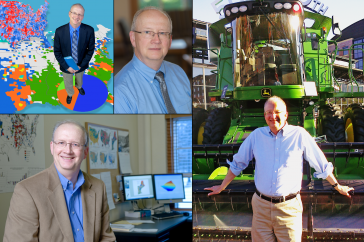Georgia Kerns knew that the idea of developing a course on mentoring adolescents with disabilities was a good one. At any one time during the last few years, she has had three, four, five undergraduates volunteering on their own to work with middle school and high students who have special needs.
This semester, the third that Kerns has taught EDUC 556, “Mentoring adolescents with disabilities in the transition to work,” four of the 19 students taking the coursehave a disability.
“This has been a learning experience for all of us,” says Kerns, an associate professor of education.“It has helped the UNH students understand what it is they are learning in class, and has provided the young adults with a diagnosis of a disability the opportunity to be involved.”
One of the young adults has taken the course previously. He processes information differently; it takes him a bit longer so it isn’t easy for him to be spontaneous. Yet, Kerns says, his comments are thoughtful; appropriate; valuable.
“The UNH students have been very patient with him. They realize when he has a response, it’s well thought out,” she says. “And he’ll ask questions some of the undergraduates wouldn’t ask. They see what we are talking about when we talk about disabilities; what it means in a person’s life. The UNH students are being introduced to a very different opportunity. It’s been eye-opening.”
Students can take the course up to six semesters for two credits a term. This, Kerns says, allows for consistency in mentoring adolescents with disabilities. In addition to the class work, once a week each student works with or serves as a mentor, allowing the mentee to learn what it takes to be successful in the workplace.
“There are mentors and mentees in the library, the Whittemore Center, at Cornucopia,” Kerns says. “One of my students is mentoring two high school students in the citizens’ police academy.”
All of the students read the same books. Kerns chooses one reference and two adolescent novels each term. This semester’s works of fiction are “Wonder” by R. J. Palacio and “Rules” by Cynthia Lord.
“Wonder” tells the story of a boy born with a facial deformity that, until 5th grade, had prevented him from going to a mainstream school. Now that he’s there, he just wants to be treated like a regular kid. “Rules” is about a 12-year-old girl whose brother has autism.
Having students in the class who have been diagnosed with a disability has helped the UNH students look at their classmates as individuals, not as a diagnosis, Kerns says. And it has helped her look at herself.
“Having students with an intellectual and developmental disability in the class has helped me learn about my own teaching. It’s making me rethink the materials I use, and realize I have to be thoughtful about what I select,” Kerns says. “There may be times when the reality of what the books talk about is right there in the classroom. I need to be mindful of that.”





















































